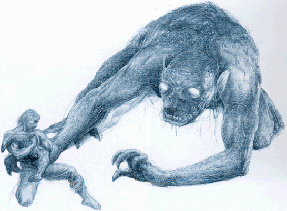John Gardner, the author of Grendel, uses Grendel as a symbol for the necessity for a dark side to everything, where a hero is only as great at the monster he faces. This means that Grendel, while trying to be a good character, ends up being the villain when he isn’t accepted by the Anglo-Saxons.
Grendel’s status as a self-described monster affects how he tells the story. Grendel’s isolation and loneliness as the only of his kind leads him to feel the need to be understood and have connection to the world. In Grendel, the humans are portrayed negatively. When Grendel goes to Herot when the Shaper is singing, he is attacked and driven away. After that incident, Grendel is wary of the humans and watches Hrothgar’s kingdom daily in hopes to be part of the Anglo-Saxon society. By using Grendel’s perspective to tell the story, a new light is brought into the story. Grendel feels like he is related to humanity and even though he eats humans, he is moved by their works. He witnesses how the humans in Herot live, their behavior, and their logic. Instead of the humans’ fear and insecurities leading the story, like in Beowulf, Grendel’s animalistic yet human instincts give Grendel a unique viewpoint, thus a special way of telling his story.

No comments:
Post a Comment